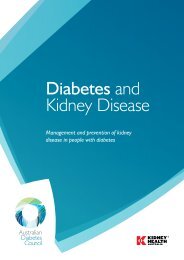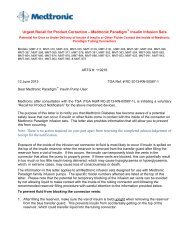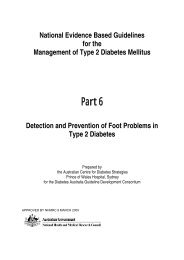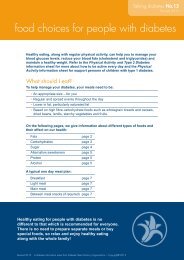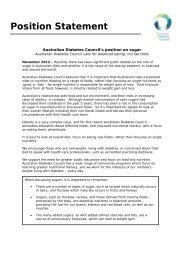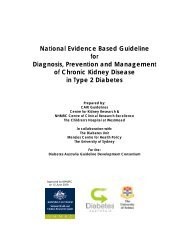O MeA e tAtAU OnA e IlOA - Australian Diabetes Council
O MeA e tAtAU OnA e IlOA - Australian Diabetes Council
O MeA e tAtAU OnA e IlOA - Australian Diabetes Council
Create successful ePaper yourself
Turn your PDF publications into a flip-book with our unique Google optimized e-Paper software.
8<br />
Common Questions about Food and<br />
<strong>Diabetes</strong><br />
How often should people with diabetes eat?<br />
It is important for all people with diabetes to eat regular meals over the day. This helps to<br />
spread food intake out and prevent blood glucose levels going too high or low.<br />
Some people with diabetes take tablets or insulin to help manage their diabetes. These<br />
medications may mean that you need to eat at certain times, eat a small snack between<br />
meals or have a snack before bed. Discuss with your dietitian, diabetes educator or doctor<br />
whether you need to eat at certain times or need to eat snacks.<br />
If you eat irregular hours (or you do shift work) it is important to discuss this with your<br />
dietitian, diabetes educator or doctor as your medications may need to be adjusted to fit in<br />
with when you are able to eat. It is important that you do your best to have a regular eating<br />
pattern from day to day.<br />
Why is it important to manage my weight?<br />
Being overweight can make it harder to control your blood glucose levels. Carrying too much<br />
fat around your middle is especially bad for diabetes and heart disease. If you are overweight,<br />
ask your dietitian for advice on how to adjust your food intake to lose weight. Also speak to<br />
your doctor or an exercise physiologist about exercise.<br />
Can I eat fruit? What type of fruit can I eat and how much?<br />
Yes, people with diabetes can eat fruit. Fruit is an excellent source of fibre, vitamins and<br />
minerals. All fruit can be included as part of a healthy diet for people with diabetes. Fruit<br />
contains natural sugar therefore it is important to spread fruit over the day. Fruit also contains<br />
kilojoules, and it can cause weight gain if you eat too much. It is important not to over eat<br />
fruit but aim for 2-3 serves a day.<br />
The recommendation for fruit is the same as the general population. That is, two servings of<br />
fruit each day. 1 serve of fruit equals:<br />
• 1 medium piece of fruit (e.g. 1 apple or 1 orange or 1 pear)<br />
• 2 smaller pieces of fruit (e.g. 2 plums or 2 kiwifruit)<br />
• 1 cup chopped or canned fruit in natural juice (not in syrup)<br />
• 1½ tablespoons of sultanas or 4 dried apricots*<br />
• 1 small mango<br />
• 1 cup pineapple, watermelon or rockmelon<br />
• 1 ½ cups diced papaya or pawpaw<br />
• 1 small banana.<br />
Fruit juice is high in kilojoules and does not contain fibre. It is much better to eat the whole<br />
fruit rather than drink the juice. Drinking too much juice raises blood glucose levels and may<br />
contribute to weight gain. If you must drink juice, limit to a maximum of 1 small glass a day.<br />
*Dried fruit contains a lot of natural sugar. If you eat dried fruit limit to a small quantity e.g. 1½<br />
tablespoons of sultanas or 2 dates or ½ medium spear of dried paw paw or ½ a pineapple ring.<br />
36




